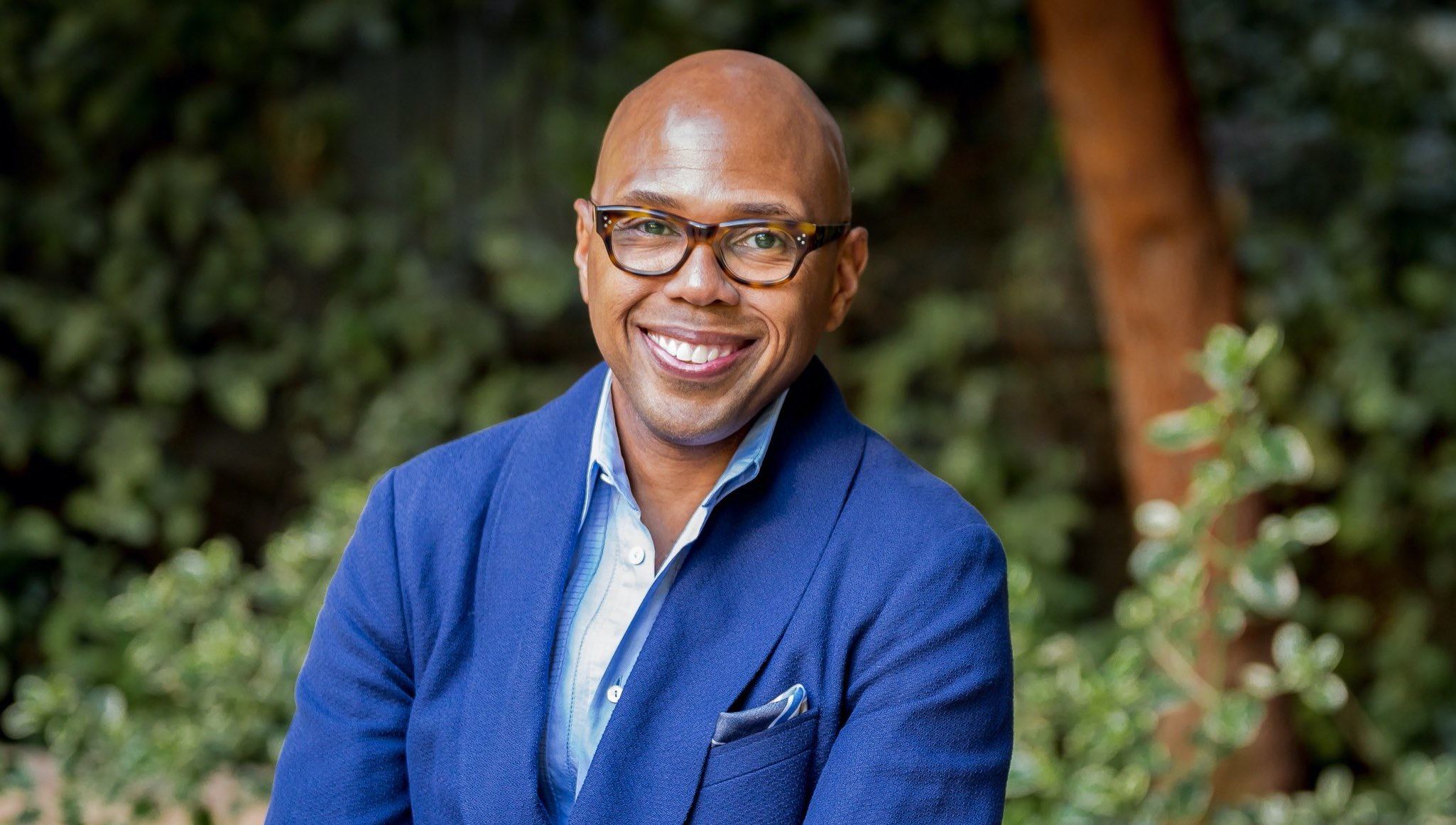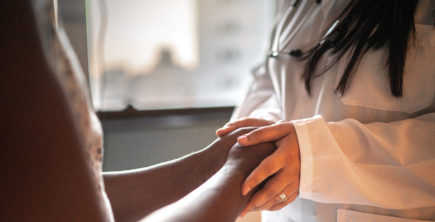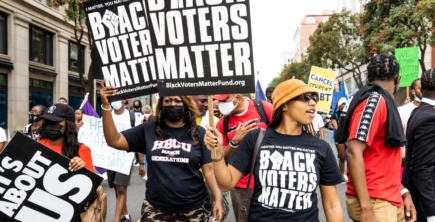
Our Community

Brickson Diamond has been an expert in diversity, equity, and inclusion (DEI) long before it became a top priority for philanthropy. In fact, for the past two decades, Diamond has applied his expertise in DEI across numerous industries including philanthropy, entertainment technology, investment management, and nonprofit.
Currently, he serves as an executive search consultant at Spencer Stuart, where he provides his expertise in DEI to help major corporations with executive searches, leadership, succession, and talent development.
He was the founder and CEO of Big Answers, a consulting firm that helped clients amplify their values, success, commercial leadership, and board strategies as it relates to DEI. Diamond also previously served as executive vice president and chief operations officer for the Executive Leadership Council, one of the most respected convening and leadership development organizations for Black executives and board members, and co-founded the Blackhouse Foundation, a nonprofit that seeks to increase diverse representation in film and content creation. Diamond continues to serve in a variety of board and community leadership roles, including vice chair of Tides’ Board of Directors, with the goal of working “in service of advancing opportunity and access for those who should have it, but do not.”
In this interview, Diamond tells us more about his calling and how he has been lending both his expertise in DEI and lived experience as an openly gay Black man to foster a more equitable world and support the next generation of LGBTQ+ professionals.

What inspired you to pick up the torch of advancing opportunity for those who should have it, but do not?
I think it started with my upbringing. I was born and raised in Atlanta, which I like to refer to as Wakanda. You know, it was a locus of Black exceptionalism, quite frankly. I say that because I grew up in a world where my friends’ parents were serving as mayors over my entire childhood. Once I entered college, I realized how rare it was for a young person to live in a city led by Black elected officials. From very early in life, I understood both the opportunities and responsibilities that came with leadership. And so the juxtaposition of that heightened level of Black leadership and influence in Atlanta compared to the rest of the country and the world, I found quite startling. When I entered Brown University, which is a very progressive, embracing, and wonderful place, I encountered other Black students from places that were unlike where I was born and raised, even places as evolving as Manhattan, despite whatever privileges they might have had, I learned these students didn’t have the privileges that I had during my upbringing.

Brickson Diamond with his godmother and civil rights leader, Juanita Jones Abernathy.
My godparents, civil rights leaders Ralph Abernathy and Juanita Jones Abernathy, also inspired me. I grew up very aware of the behind-the-scenes sacrifices and efforts of the civil rights movement of the 50s and 60s. My Uncle Ralph was left to lead the movement after Martin Luther King Jr.’s assassination. So, I understood from witnessing him take on this role, the sort of duty but also the debts that came with leadership. I have always understood that it’s not about there being a lack of diverse talent for leadership roles, but rather a deficit of opportunity.
When you state you want to support those who should have opportunity but do not, are you speaking of historically marginalized communities?
I’m trying to get my head around the language of “historically marginalized communities” in which there has been historic underinvestment. I often remind people, if you’re working in a country that has been colonized, then race is an issue, so they must consider the context in which they’re operating. In America, when thinking about who has been underserved, it’s people of color, Black folks, LGBTQ folks, and folks with disabilities. These communities have been the most systemically relegated to poverty.
At Tides, we often discuss how we can sustain our energy knowing systemic changes take ongoing effort. How have you sustained yourself in the pursuit of advancing opportunity?
I tend to be an optimist. I feed off not just success, but possibilities. And I certainly have my moments of being discouraged and exhausted. But you know, I’ve reached a point in my career where I get to do what I want to do. Interestingly, I did an interview with Brian Moynihan, the chairman and CEO of Bank of America, weeks after the murder of George Floyd about diversity, because we sat on the Brown University’s board together, and I marveled at the intensity of focus and interest that Brian had for Brown. Whenever I thought, “I can’t go there, I can’t make it to Providence, this is too much,” I reminded myself, somehow Brian has figured out how to run Bank of America and participate in three days of meetings in Providence, so I can probably figure this out.
When I asked Brian, “How do you do it?” he replied, “I only do the things that are top priority.” If you are passionate about something and curious about it, you will find the time and energy. And so, for me, I think the secret sauce here has been to align my time with missions I am passionate about, so that one part of my life complements another part of my life. It’s not as if I’m working in discrete buckets. I’m working in this sort of uniform circle of activity. Whereas one element may be a little discouraging, there’s another element that picks me up. For example, I’ve always been fed and affirmed by working in philanthropy. In fact, my nonprofit boards and leadership experiences have almost always outpaced my professional opportunities as a Black, openly gay man, which gave me fuel rather than left me feeling dispirited.
As someone who has been doing this work for decades, what is your definition of DEI?
My definition is pretty broad and regular. Candidly, it’s about finding the promise in the broadest cross section of people who are engaged in your enterprise or effort, but in a way that allows and encourages differences of backgrounds, identities, experiences, and perspectives. The idea here is that we’re going to get better by being challenged at every turn, rather than just waiting for our homogeneous idea to be revealed to the light of day. So to me, it is about the result. It’s about finding the most interesting, eclectic, and broad cross section of talent to solve a problem in an innovative and spirited way.
How do you encourage people to honor the uniqueness of each individual?
That’s about vulnerability. I’m reminded of a bell hooks quote that essentially states no one can subscribe to the patriarchy without sacrificing themselves. I find as individuals we have done a lot to gain access to the “in” group; that is, we’ve made sacrifices to be a part of the whole. Being vulnerable yourself is key to having more personal and impactful DEI discussions.
In 2020, the William and Flora Hewlett Foundation commissioned a study about how U.S. foundations find and use information about effective philanthropy. DEI emerged as the leading topic of interest for funders, and it remains a top priority. Do you have any specific advice for how you believe the philanthropic community can best center DEI in its practices?
Yes, absolutely. It’s about elevating the perspective, insights, and voices of the beneficiary, which makes me think of the quote, “Nothing About Us Without Us.” I’m proud of Tides because we’re able to deliver philanthropic resources in the form of money and capacity building. Whether it’s through fiscal sponsorship or providing administrative support to leaders who are on the ground, we’re not bringing them a prescriptive set of solutions that we create in some ivory tower. Rather, we provide fuel and an engine for those folks who are closest to the challenges, while also taking away the structures that impede them from doing that work, so they can develop their own innovative solutions.

Brickson Diamond speaks during the Unplugged Session at TED2019: Bigger Than Us. April 15 – 19, 2019, Vancouver, BC, Canada. (Photo © Ryan Lash / TED)
In honor of Pride Month, you recently participated in a panel discussion hosted by America on Tech with other LGBTQ+ professionals serving in the tech industry to explore how corporate leaders can strengthen the power of LGBTQ+ communities and the next generation of LGBTQ+ professionals in the context of the future of work. Can you share with the Tides community some advice that you offered during that discussion? Specifically, how can corporate leaders best serve as an ally to the LGBTQ+ community?
I think it goes back to that vulnerability piece again. I often say to clients, when they ask how they can best support diverse communities, I tell them, “Give them some money — unlock the cabinet of the resources.” It’s important for people to have accepting hearts and minds and create platforms that allow for people to thrive, but I think it is about giving resources at the end of the day. I think it’s about not just empowering the movements that may be underway for any particular group, particularly in the LGBTQ+ community. And for us, I think it’s trans Black women who are the most vulnerable. I recommend that leaders devote 90 percent to the most vulnerable of our population, which I think is about giving them resources — cold, hard cash. So, they can do what we just talked about: effect the changes that they see as being most essential and likely to succeed. Hearts and minds are important, acceptance is essential, but money talks.
Why is it important to you to speak up for the next generation of LGBTQ+ professionals?
I love to inspire, in this case, the next generation of LGBTQ+ leaders, which offers both affirmation and encouragement. I didn’t have a lot of gay, Black, out professionals to learn from early in my career. It is important to me to share with this next generation that they should work where they are affirmed and supported. More so, I want them to know it’s OK to stick around organizations for the long haul, but they should understand their value. I want to convey that it’s important for them to claim their worth and understand their flexibility to move. Kill it while you’re there, but when you’re done, move along.
I’m sure you’re invited to serve on many boards. As our compassionate leader Janiece Evans-Page would say, why did you choose us?
I was invited to join the Tides Board twice and didn’t join until the second time. I accepted when I could fully commit to the opportunity, which was important to me. Joining the Tides Board for me allowed me to return to the scaling of the work that we did at the Liberty Hill Foundation. When I was serving on that board in the early 2000s, it was a great opportunity to engage in community focused and social impact philanthropy. Serving on the Tides Board is an opportunity to work in that space again, but on a larger scale both nationally and internationally. I learned at Liberty Hill the sheer genius of grassroots and local organizers. This is an opportunity to come back to that table and continue to learn.
At Tides, we’re leaning into our mission of building a world of social justice and shared prosperity by strengthening the power of BIPOC proximate leaders. What are you most looking forward to as we lean into this social impact goal?
I’m super excited about Janiece’s pursuit of operational excellence. I’m an avid believer in the notion that my job as a board member is to be nose in and fingers out. I look forward to experiencing the operational excellence that Janiece and the team will bring to Tides. I’m also thrilled we are focused on this universe of leaders with that level of excellence and effectiveness because I think it does two things. First, it delivers the value and the support that we aim to direct towards these leaders in a much more impactful way, and secondly, it sets a new standard for our relationship with movement leaders. I think we will have a greater impact through our work and partnerships with this new focus.

Our Community

Healthy Individuals & Communities

Racial Equity

Read the stories and hear the voices of social change leaders fighting for justice.